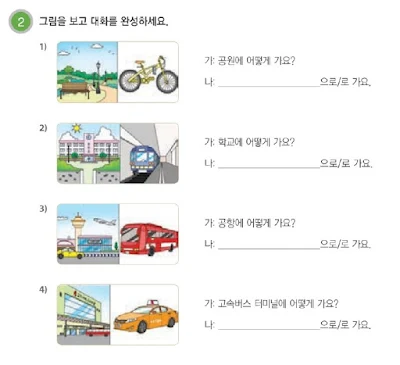KIIP 1 Lesson 13: N-(으)로and V-(으)로 가다/오다 grammars = ‘by means’ and ‘go to do’ in Korean
1. N-(으)로 grammar = ‘by means of transportation’
- It is used when talking about a means of transportation. (이동의 교통수단을 말할 때 사용해요.)
버스로 집에 가요? – 아니요. 지하철로 가요.
Do you go
home by bus? - No. I take the subway.
라민 씨, 학교에 어떻게 와요? – 자전거로 와요.
Ramin, how
do you get to school? - I take a bike.
공항에 택시로 가요.
I take a
taxi to the airport.
Tense
Noun ending
in vowel + 로
비행기 -> 비행기로 (by airplane)
버스 -> 버스로 (by bus)
*지하철 -> 지하철로 (by subway)
Noun
ending in consonant + 으로
여객선 -> 여객선으로 (by ferry)
Examples
1. 공원에 어떻게 가요? – 자전거로 가요.
How do you get to the park? – I go by
bike.
2. 하교에 어떻게 가요? – 지하철로 가요.
How do you get home from school? - I go by
subway.
3. 서울에 어떻게 가요? – 기차로 가요.
How do you get to Seoul? - I go by train.
4. 고향에 어떻게 가요? – 비행기로 가요.
How do you get to your hometown? - I go by
plane.
2. V-(으)로 가다/오다 grammar = ‘go to do’ in Korean
- It is used to indicate purpose of movement. (이동의 목적을 나타낼 때 사용해요.)
공원에 가요?
– 네,
자전거 타러 가요.
Are you going to the park?
- Yes, I go there by bike.
라흐만 씨,
한국에 왜 왔어요?
– 일하러 왔어요.
Mr. Rahman, why did you
come to Korea? – I came to work.
친구들과 식당에 점심을 먹으러 가요.
I'm going to a restaurant
for lunch with my friends.
Tense
Verb
ending in consonant + 으러 가다/오다
받다 (to receive) -> 받으러 가다/오다
찾다 (to find) -> 찾으러 가다/오다
*듣다 (to listen) -> 들으러 가다/오다
*짓다 (to build) -> 지으러 가다 /오다
Verb
ending in vowel + 러 가다/오다
사다 (to buy)-> 사러 가다/오다
타다 (to ride)-> 타러 가다/오다
*놀다 (to play)-> 놀러 가다/오다
*만들다 (to make) -> 만들러 가다/오다
Examples
1. 제이슨 씨가 어디에 가요? – 버스 정류장에 가요.
거기에
왜 가요? – 버스를
타러 가요.
Where is Jason going? - He goes to the bus stop.
Why is he going there? - He goes to catch the bus.
2. 이링
씨가 어디에
가요? – 교실에 가요.
거기에
왜 가요? – 수업을
들으러 가요.
Where is Iring going? – She goes to the classroom.
Why is she going there? – She goes to attend class.
3. 안젤라
씨가 어디에
가요? – 회사에 가요.
거기에
왜 가요? – 일하러
가요.
Where is Ms. Angela going? - She goes to work.
Why is she going there? - She goes to work.
4. 아나이스
씨가 어디에
가요? – 도서관에 가요.
거기에
왜 가요? – 책을
빌리러 가요.
Where is Anais going? – He goes to the library.
Why is he going there? – He goes to borrow books.
Practices for the N-(으)로 (수단)
grammar
See the example and complete the sentence <보기>를 보고 문장을 완성하세요.
Practices for the V-(으)로
가다/오다 grammar
See the example and complete the sentence <보기>를 보고 문장을 완성하세요.
Review KIIP 1 Lesson 12 V-(으)ㄹ 거예요and A/V-고 grammars = ‘future tense’ and ‘listing’ in Korean



